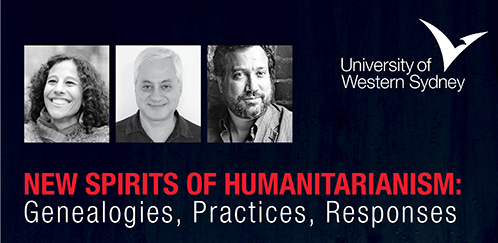New Spirits of Humanitarianism
New Spirits of Humanitarianism: Genealogies, Practices, Responses
International Workshop

Organisers: Jessica Whyte and Sonja van Wichelen
Dates: 11-12 December 2014
Venue:
Female Orphan School, Parramatta South Campus, University of Western Sydney [Getting to Parramatta]
The final program is available here PDF, 231.5 KB (opens in a new window)
Humanitarianism
is changing. Increasingly professionalised and instrumentalised it has become a
full-blown industry with its own standards of efficiency, transparency,
evidence, and best practice. Replacing an earlier framework of
internationalism, one which relied on the cooperation of nation-states and
their commitment to international law, humanitarianism's justifications are
more and more entangled in a politics of life intimately connected to wider
forms of liberal governance. Today, the legitimating power of humanitarian
reason lies not so much in the authority of the political subject as in a moral
imperative to protect the depoliticised suffering body.
Emerging scholarship is attending to the transformation of humanitarianism into
an extension of governmental attempts to manage populations and risks (Calhoun
2008; Fassin 2012; Ticktin 2011). No longer outsiders in the realm of
realpolitik, "humanitarians" as David Kennedy starkly puts it,
"increasingly provide the terms in which global power is exercised."
(Kennedy, 2005). Uncovering humanitarianism's foundational paradox – that for
all its claims to shared humanity it is premised on (postcolonial) inequality –
the endeavour becomes a moral choice of wealthy nations at best and a form of
state violence at worst (Weizman 2012). As such, while emergency relief
operations rely on the performance, efficiency, and economic viability of the
humanitarian industry, military institutions engage humanitarian reason to
legitimate war and violence.
Humanitarian government affects the ways in which we conceptualise emergency,
trauma, victims, and perpetrators. It gives new meaning to suffering and pain
and reorders the worth of lives within liberal understandings of humanity. In
conflict-ridden regions this is manifested in differential treatments of lives
that need to be "saved" and the lives that are "risked";
but it is also evident in domestic border making within immigration politics
and in the way in which differential regimes of inclusion and exclusion affect
the everyday lives and subjectivities of asylum-seekers, refugees, and
"illegal" migrants.
This workshop aims to problematise and explore genealogies, practices and
responses to the new spirits of humanitarianism in late modernity. Central to
the humanitarian focus on the suffering of bodies is the assumption that such
suffering can be described independently of historical and contexts (Meister,
2011). In contrast to this approach, this workshop seeks to interrogate the
emergence of humanitarianism and its continuing embeddedness in liberal
governmental rationalities. It asks: What are the histories of humanitarian
government? How does it relate to colonial and imperial contexts? If we can see
it as a liberal diagnostic, what does it offer to western nations or liberal
democracy? What relations exist between neoliberal forms of governmental
rationality and humanitarian reason? What role do institutions play in
according humanitarian aid and to what extent does this affect the morality of
our modern liberal will?
Keynote Speakers
Ilan
Kapoor, York University - "The
Ideology of Celebrity Humanitarianism"
Miriam Ticktin, New School for
Social Research, New York City - "Humanitarianism
and Beyond: the Pasts and Futures of Care"
Eyal Weizman, Goldsmiths,
University of London - "Lethal Warning"
Full abstracts and biographies (opens in a new window)
Keynotes are open to the public. Postgraduate students
are encouraged to attend the workshop as well.
Only a limited number of places
are available for scholars who wish to attend the workshop
as a whole (please contact the organizers). Preference will be given to those
working on humanitarianism and who can commit to attending the
entire workshop.
Organisers: Jessica Whyte and Sonja van Wichelen
Mobile options:

